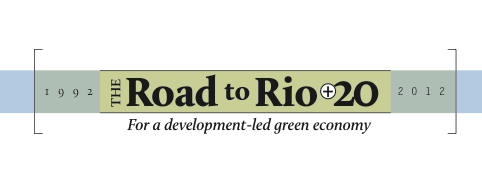Issued as the first in a series of UNCTAD publications in the run-up to the UNCSD, "The Road to Rio+20: For a Development-led Green Economy" is a collection of essays on conceptual foundations of a green economy, as well as critical issues in managing the transition, complemented by insights from Morocco as a country case study.
 2 March 2011: The UN Conference for Trade and Development (UNCTAD) has released the first of a series of publications that seek to provoke discussion, advance new ideas and provide inspiration on sustainable development issues for the UN Conference on Sustainable Development (UNCSD, or Rio 2012).
2 March 2011: The UN Conference for Trade and Development (UNCTAD) has released the first of a series of publications that seek to provoke discussion, advance new ideas and provide inspiration on sustainable development issues for the UN Conference on Sustainable Development (UNCSD, or Rio 2012).
The first publication, “The Road to Rio+20: For a Development-led Green Economy,” is a collection of essays discussing conceptual foundations of a green economy, as well as critical issues in managing the transition towards a green economy, complemented with insights from Morocco’s experience integrating environmental issues into national strategies.
In the forward to the collection, UNCTAD Secretary-General Supachai Panitchpakdi states that a “green economy” not only implies the mainstreaming of green niches in specific economic sectors, but also a change in an economy’s “overall social construct.” Noting that paths to greener economies must be socially inclusive and contribute to equitable development, he stresses key elements of a successful transition: new sources of funding that can be applied directly to transition efforts in developing countries; an enabling environment for private investment to support such efforts; use of trade as a supportive tool that avoids green protectionism; and new and effective mechanisms for transfer of green technology. He underlines that, initially, the internalization of environmental and social costs is likely to reduce real income, in particular in developing countries creating a genuine basis for significant investments to assist the transition toward a green economy and higher levels of sustainable development.
The publication is divided into four parts. Part One addresses the global context of the UNCSD with essays on environmental crises, failed growth and the steady-state economy, and the Rio Agenda. Part Two assesses possible downsides of a green economy for trade, investment and competitiveness and the relationship between green economy and sustainable development. Part Three looks at various aspects of managing the transition towards a green economy, such as peak oil and the necessary transition to regenerative agriculture, trade, finance and the green economy, and making climate change finance work for human development. Part Four comprises several essays on experiences in the transition toward a green economy in Morocco. [Publication: The Road to Rio+20: For A Development-Led Green Economy]